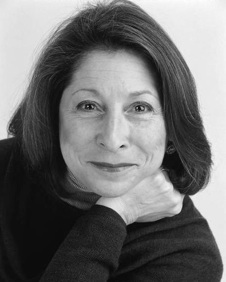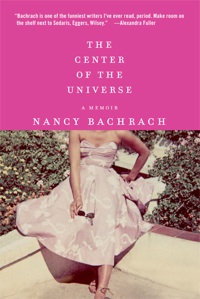
Today’s interview is somewhat untraditional, but I think you’ll enjoy it. After I read the hilarious anecdotes in Nancy Bachrach’s newly released memoir, “The Center of the Universe,” I knew I had to dig a little more on how, exactly, she copes with a dysfunctional family. Nancy formerly worked in advertising in New York and Paris, where she got to “spin hot air like cotton candy, glorifying her clients’ beloved denture adhesives and powdered orange-juice substitutes.” Before that? She was a “clumsy waitress at Howard Johnson’s, an overzealous customer-service rep fired for making genuine apologies, a stenographer for an insomniac poet, and a teaching assistant in the philosophy department at Brandeis University, where she was one chapter ahead of her class.” You like her already don’t you? Nancy lives in New York City. This is her first book. Check out her website by clicking here.
Question: How does a person live and cope with a dysfunctional family? (Yes, I really did ask that.)
Nancy: My expertise is limited to only one “dysfunctional family” — but in mine, coping was a full time job. My mother called herself “the center of the universe.” When she was soaring, she was a force of nature who could come up behind me as suddenly as a twister and turn Providence into Oz. And when she crashed, she was the wind shear beneath my wings. She was a human rollercoaster — gripping and dramatic — and I buckled up until I grew up…and got out of her gravitational pull.
Growing up, my siblings and I learned to refocus — we shifted our attention from the center ring; we distracted ourselves by transferring our anxious energy into other outlets. My brother practiced piano so intently he drowned out everything else. My sister sculpted and painted. And I turned to books. A creative outlet is a hypnotic trance – it’s an escape, a sanctuary –and we rechanneled the drama around us.
And we had each other. It helped that there were three of us. When we were kids, during the early crazy years, we hid under a blanket and put the soles of our feet together. We called ourselves the Toes Club. Vonnegut called it boko-maru — “joining the soles to connect the souls” — and I swear it worked. The mother lode brought us closer: we circled the wagons whenever there was a crisis. And while her craziness drove us away from home, it also drove us forward — and held us together.
Looking back, what’s deranged and absurd also seems ridiculous, especially when seen through a long lens…and after a lot of therapy! Thurber said that humor is chaos in retrospect. So maybe laughter is the best revenge. Even my mother was able to laugh when she read my memoir about her, “The Center of the Universe” – and it’s hardly a puff piece.
Question: You say your book is about hope (which I think it is!!). How do you hang onto hope?
Nancy: My memoir is about a freak boating accident which killed my father and left my fifty-five year old mother, the former “center of the universe,” in a coma. She was taken by ambulance to a souped-up seaside hospital so out of its depth that her chart said she was in a “comma.” She wasn’t expected to survive, but she did. Then she was diagnosed with “permanent and irreversible” brain damage. Her doctors delivered that absolute prognosis with absolute certainty. In fact, one doctor actually told me that “hope would be counterproductive.” His remark was devastating — and he was wrong.
My brother, who is also a doctor, reminded me that no one has a crystal ball — and no one can make you give up hope. No matter how unlikely it is that you’ll draw an ace, luck plays by its own rules.
Despite the expert naysaying, my mother’s brain slowly re-wired itself, and she put all of her indefatigable energy into getting up out of her wheelchair and walking out of a nursing home. Her doctors later said her recovery “defied medical explanation.” I don’t think she defied medical explanation so much as she upended a few of its wrongheaded assumptions. And if there’s a silver lining in her story, it’s that the accident finally ended her mania. She’s still spinning, but slowly.
I think that hanging on to hope is part nature, part stubbornness, part steadfastness, part need. I hoped even though hope was “counterproductive.” My brother hoped even though he was flouting medical evidence and expert judgment. My mother hoped because she had nothing else, and the alternative was unacceptable. We hoped because it made us feel better! We believe what we need to believe, no matter how cultivated our skeptical principles.
Hope is a kind of defiance. It’s a decision that has to be made again and again. Hope is hard work, and although there’s no guarantee it will lead to the desired end, maybe hope is an end in itself.
To find out more about Nancy, visit her website.
To read more Beyond Blue, go to http://blog.beliefnet.com/beyondblue, and to get to Group Beyond Blue, a support group at Beliefnet Community, click here.
To subscribe to “Beyond Blue” click here.
![]()

